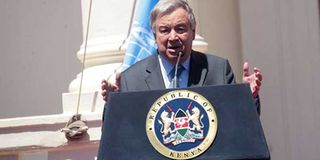Was UN boss right that joint effort has averted world war?

UN Secretary-General Antonio Guterres. He believes that multilateralism has averted a third world war but is this statement accurate? PHOTO | FILE | NATION MEDIA GROUP
What you need to know:
- Russia is acting unilaterally against fellow Security Council members.
- States engaging in military action against oppressive regimes have not always acted multilaterally.
- The underlying issue on which multilateralism is embedded has been its Achille’s heel: negotiation.
UN Secretary-General Antonio Guterres believes that multilateralism has averted a third world war but is this statement accurate?
Multilateralism has been described as any system associating several states which are united by equal and mutual obligations. The United Nations, as a chief example of multilateralism, considers it to be international cooperation and collective problem-solving.
Taking the UN definition into consideration, have states always upheld international cooperation in their military actions?
Currently, in the Syrian war we are witnessing a great divide among state powers.
Russia is acting unilaterally against fellow Security Council members.
LIBYA
In the Libyan war, 42 countries — with the USA taking the lead — were involved in the initial military intervention. Most of those countries formed part of Nato.
How were the other states involved in the collective problem-solving to avert loss of civilian lives? Closer home, the Democratic Republic of Congo is in its second civil war. Little multilateralism is being witnessed to quell the ongoing war with the UN struggling to maintain peace.
In these all too real and frightful scenarios, multilateralism seems to have been trumped by unilateralism.
States engaging in military action against oppressive regimes have not always acted multilaterally.
The underlying issue on which multilateralism is embedded has been its Achille’s heel: negotiation.
MILITARY INTERVENTIONS
With 193 member states forming the UN General Assembly, not all proposed military interventions have received unanimous decisions. If anything, even where decisions have been unanimous, abstentions notwithstanding, the decisions are resolutions and therefore not binding.
The Security Council is where the power lies to bind or veto decisions. Russia alone has issued more vetoes than any other permanent member of the Security Council in the last five years.
Due to its veto, the UN cannot intervene in Syria. Is there much international cooperation evident here when a state would rather act unilaterally?
Thus, in the end there is no accord. Dominant states take the lead in military intervention as they deem fit with their norms and sovereignty, not only turning to unilateralism but nationalism. This has taken the form of aligned state coalition or intervention through international institutions.
INTERNATIONAL NORMS
For multilateralism to succeed, states must follow international norms and pay more respect to international institutions.
Article 2(4) of the United Nations Charter fails to explicitly prohibit the use of force.
“All Members shall refrain in their international relations from the threat or use of force against the territorial integrity or political independence of any State ..."
The rules of multilateralism give states room for unilateral discretion on military interventions, making it difficult to achieve the international cooperation crucial to multilateralism to work. This particular rule itself calls into question the relevance of multilateralism. Consequently, the Iraq war was undeniably a USA unilateral action, albeit with supporters.
Still sticking with the norms, Chapter 7 of the Charter then allows the use of force authorised by the UN Security Council, with Article 51 allowing the use of force under the right of individual and collective self-defence, if an armed attack occurs against a member of the UN.
With such rules in place, states have gone to war unilaterally regardless of the attack not being charged against them. Yet again, the basis of such military action has not been the principle of multilateralism but unilateralism.
MAINTAIN PEACE
It can only be concluded that where states can act unilaterally, they will do so against multilateralism despite it being the founding principle of the establishment of the UN to maintain peace.
Respectfully, if indeed by a world war we mean the absence of allies and enemies of the first and second world wars engaging each other in combat, then indeed, we have not witnessed a third world war.
Instead of a single war we have progressively witnessed unilateral wars, some of which are in disregard of multilateralism such as Syria, others which are yet to witness the effects of multilateralism such as Yemen. To an extent multilateralism has averted the third world war, but the new global order is unilateralism. And so, unilateralism has averted the third world war.
Ms Burini works with an international airline on dispute resolution. [email protected]





